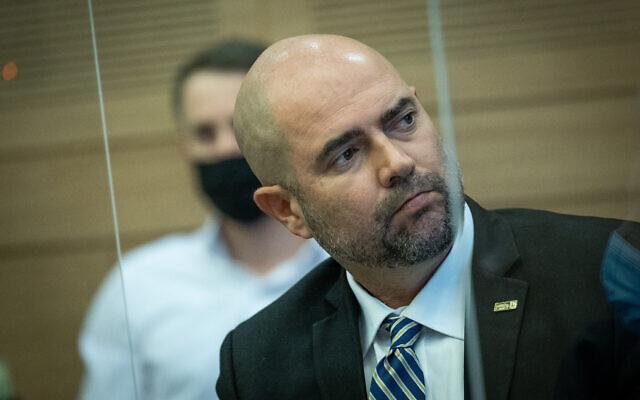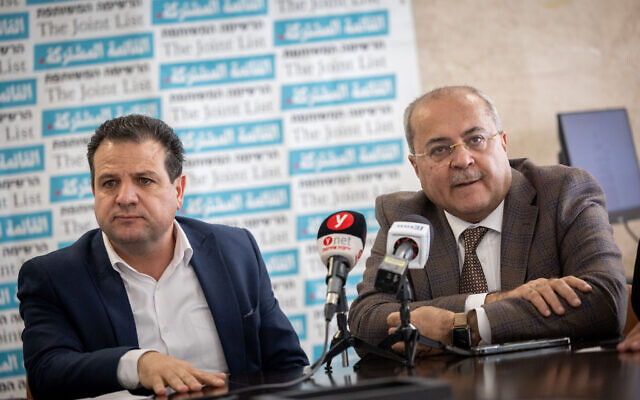Americans are spending $61B on Ukraine’s war effort. What will

Joint list leader accused of incitement for call on Arab Israeli cops to quit force
The head of the Joint List party Ayman Odeh caused outrage on Sunday when he said Arab Israelis serving in the security forces were “humiliating” their own people and called on them to throw down their weapons and quit.
Odeh, in a Ramadan video posted from the Damascus Gate in Jerusalem’s Old City, also said his ultimate goal was to see the Palestinian flag flying over Jerusalem.
The lawmaker’s comments sparked calls to investigate him for inciting violence and come as Israel is facing the deadliest wave of terror attacks in decades. Among those killed was an Arab Israeli officer Amir Khoury, who was hailed as a “hero of Israel” after he died in a firefight stopping the terrorist who carried out the Bnei Brak shooting attack.
“Recently, I have met with many groups from occupied Arab Jerusalem. Young Palestinians with Israeli citizenship have told me that they are being harmed and humiliated. It is important for me to tell me from here, the Damascus Gates, that it is a humiliation for one of our sons to join the security forces,” Odeh said in a video posted to his Facebook page.
Damascus Gates has been the scene of near-daily clashes between Palestinians and the Israel Police since the start of the Muslim holy month of Ramadan.
Odeh said Arab Israelis who join the Israeli security forces were “humiliating our people, humiliating our families and humiliating everyone who comes to pray in the Al-Aqsa Mosque.”

Israeli police officers carry the coffin of police officer Amir Khoury, who was killed in a terrorist shooting attack in Bnei Brak, ahead of a funeral service in Nazareth, March 31, 2022. (Jalaa MAREY / AFP)
“Our historical position is that we will be with our people to end the murderous occupation so that the state of Palestine will be established and Palestinian flags will be hoisted on the walls of Jerusalem,” he said.
Odeh called on those who had already joined to “throw the weapons in their faces.”
“Young people must not join the occupation forces. I call on the young people who have already joined, who are no more than one percent, a total of a few thousand, whose joining is insulting and humiliating, I call on them — throw the weapons in their face and tell them that our place is not with you. We will not be part of the injustice and the crime,” he said, saying that Arab Israelis had to be a part of the “Palestinian Arab people, and in a just war to bring an end to the criminal occupation.”
His comments drew outrage from many and Hebrew media reported that the police had asked the Attorney General for an opinion if his remarks warranted opening an investigation into incitement to violence.
Several MKs in the opposition Likud party also called for Odeh to be investigated.
“Ayman Odeh’s call for Muslim police officers to throw down their weapons, at a time when Israel is in the midst of a battle against terror from within and without, is serious incitement that could lead to violence against the officers and harm to the security of the nation,” tweeted former finance minister Israel Katz. “Odeh’s place is not in the Knesset but in jail.”
“In a just world this man would be arrested tonight and tried quickly,” said former Likud police minister Amir Ohana.
“But in our world, he could still be a safety net for the government of Bennett, (Gideon) Sa’ar and Avigdor Liberman,” he said referring to speculation that the current government could rely on Odeh’s party for outside support after losing its majority in the Knesset this week.

Likud MK Amir Ohana attends a Knesset committee meeting, December 13, 2021. (Yonatan Sindel/Flash90)
In response, Prime Minister Naftali Bennett’s Yamina party put out a statement saying that “despite rumors, the Joint List will not be part of the coalition or government.”
It accused Likud and other tight-wing opposition parties of collaborating with Odeh to try and bring down the government.
Odeh had on Saturday refused to commit to joining any possible vote of no-confidence to bring down the government if it means helping opposition leader MK Benjamin Netanyahu.
Odeh said it is still too early to talk about dispersing the Knesset, despite the government having lost its narrow majority in the parliament last week when MK Idit Silman, a member of Bennett’s own Yamina party, quit the coalition.
With the coalition now holding just half of the Knesset seats, Netanyahu’s Likud is seeking to gain enough lawmakers to support a no-confidence vote, triggering fresh elections. As a result, the Joint List, with six seats, could find itself holding the balance of power.
Though Odeh said the current coalition is “a bad right-wing government” that is harming Arab Israelis, he stressed that Netanyahu is not a viable alternative in his view.
“If anyone thinks we will partners with Netanyahu for a constructive vote of no-confidence — no way,” Odeh said during an interview with Channel 12 news.
“We are the furthest from Likud — that is what we were, what we will remain — especially with the Likud of today with Benjamin Netanyahu,” he said. “I think that Netanyahu is the most dangerous person in the country.”

MK Ayman Odeh (left), head of the Joint List, and MK Ahmad Tibi attend a faction meeting, at the Knesset, in Jerusalem, on March 7, 2022. (Yonatan Sindel/Flash90)
Odeh noted that “no one has approached us” from the government in the wake of the recent developments.
MK Mansour Abbas, who leads Ra’am, an Arab Islamist party that is in the coalition, told Channel 12 that his faction will not be persuaded to defect to the opposition.
“I will not let this government fall apart, even if I get a commitment from Netanyahu,” Abbas said.
Silman announced Wednesday that she was quitting the government due to the “harming” of Jewish identity in Israel, robbing the coalition of its one-seat majority.
Silman said she would work to establish a right-wing coalition in the current Knesset, but denied reports that she has struck a deal to join Likud. She also claimed that the current coalition had offered to give her the post of health minister to win back her support, which she said she rejected.
The coalition — an unlikely alliance of eight disparate parties — has been scrambling to keep other possible renegades in line and project stability, even as it teeters on the brink of collapse following Silman’s departure.
With Silman exiting the coalition but not the Knesset, Bennett’s government holds just 60 of 120 seats. The paths forward for the coalition and the Knesset are not immediately clear, with a new election seen as the most likely outcome, but the timeline still uncertain.
